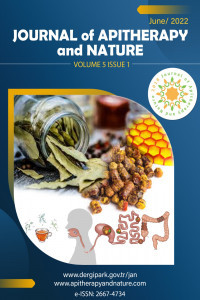The Influence of Propolis on Liver Pathology in Broilers
The Influence of Propolis on Liver Pathology in Broilers
Liver Pathology, Broilers, Propolis,
___
- 1. Klaric I, Pavic M, Miskulin I, Blazicevic V, Dumic A, Miskulin M (2018) Influence of dietary supplementation of propolis and bee pollen on liver pathology in broiler chickens. Animals 8: 54.
- 2. Bhadauria M, Nirala SK (2009) Reversal of acetaminophen induced subchronic hepatorenal injury by propolis extract in rats. Environmental Toxicology and Pharmacology 27: 17-25.
- Yayın Aralığı: Yılda 2 Sayı
- Başlangıç: 2018
- Yayıncı: Oktay YILDIZ
Mihaela NICULAE, Laura STAN, Adriana URCAN, Timea DOMOKOS, Daniel S. DEZMIREAN, Otilia BOBIS
Intestinal Morphology Broiler Chickens Supplemented with Propolis
Maja MISKULIN, İvana KLARIC, Matija DOMACINOVIC, Berislav PRAKATUR, Mirela PAVIC, Nika PAVLOVIC, İvan MISKULIN
An Overview of Chemical Studies and Biological Activities of Mediterranean Propolis
Konstantia GRAIKOU, İoanna CHINOU
Phenolic Compounds of Spain Propolis
Félix ADANERO-JORGE, M Camino GARCÍA-FERNÁNDEZ, Rosa M VALENCIA-BARRERA, J. Javier SANZ-GÓMEZ
Toothpaste with Propolis “Apident” Shows Antimicrobial Activity in vitro
Klemen RIHAR, Dunja Gregorič EXEL, Adriana PEREYRA, Rok KOPINČ, Bratko FILIPIČ
Thirteen Flavonoids from Green Propolis from Minas Gerais, Brazil, Analyzed for Six Years
M. D. FREITAS, G. A. LOPES, N. A OLIVEIRA, B. M. ALMEIDA, S. R. L. ABREU, R. C. BASQUES, N. S. BINDA, S. M. FIGUEIREDO
Use of Propolis in Clinical Medicine. A review
The Impact of Honeybee Origin on the Quality of Propolis
Gomes da Silva CAHANGO, Soraia I. FALCÃO, Miguel VILAS-BOAS
Preliminary Evaluation of the Cytotoxic Potential of North-West Romanian Propolis
Constantin İ. MATES, Emoke PALL, Marina SPINU, Laura STAN, Mihaela NICULAE
The Influence of Propolis on Liver Pathology in Broilers
Maja MISKULIN, Ivana KLARIC, Matija DOMACINOVIC, Berislav PRAKATUR, Albina DUMIC, Daniela Cacic KENJERIC, İvan MISKULIN
